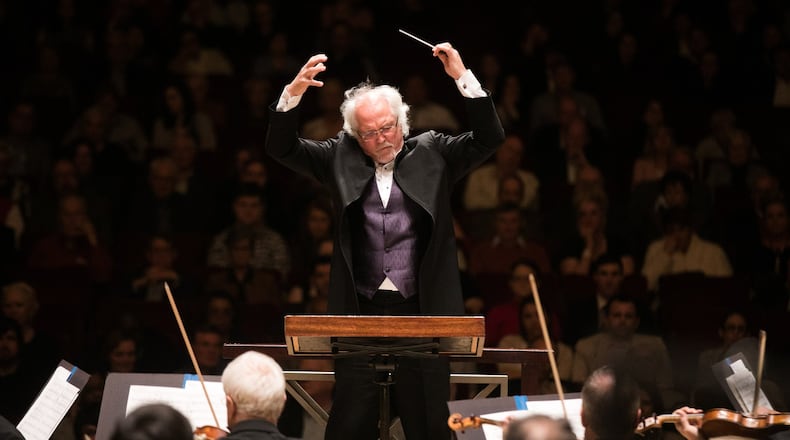When the Atlanta Symphony Orchestra played a richly blended triple-forte Thursday night, led by a brass section anchored by an authoritative tuba, it sounded otherworldly: It was as if an organist had pulled out all the stops and was raining down on the keys with demonstrable force.
During the concert — which programmed Anton Bruckner’s expansive, hourlong final symphony with his significantly shorter and more emotionally powerful choral work “Te Deum” — the orchestra had plenty of opportunity to wail.
In Bruckner’s Symphony No. 9, as led by principal guest conductor Donald Runnicles, the ensemble routinely and often produced a wall of sound — a thick fog of polyphony, played at top volume. These frequent passages were almost always followed by an abrupt change in dynamics and feel, creating a constant musical tug-of-war. Loud, intense sections of ominous, dissonant chords bled into intensely quiet passages of beautiful music. In this way, Bruckner’s Ninth sounded, at times, like an eclectic mix tape. The symphony is full of bits and pieces of striking music — driving, rhythmic cellos, sawing away with abandon, were like the churning, muted power chords of a grunge masterpiece; pastoral themes, led by the flute, came across as light and bright and wonderfully airy.
On Thursday, Runnicles confronted a staggering task: keeping everything together, navigating significant shifts in musicality, emphasizing the correct instrumental parts at the right time, and ensuring a pleasant blend of instruments. He made sure the ensemble fully committed to every musical twist and turn, showing why Runnicles, who recently received a two-year extension of his ASO contract, is the go-to conductor for sprawling Romantic works. A common criticism of Bruckner is that his symphonies are self-indulgent and overly long; Runnicles made each repetition, every seeming indulgence, sound fresh and unique. The players followed his every move, playing beautifully with only a few minor hiccups.
After the emotional and sometimes disorienting symphony, the “Te Deum” was straightforward and to the point. There was no meandering in this score. The ASO Chorus produced confrontational triple-forte passages without shouting or overwhelming the orchestra, which played the pre-minimalism accompaniment with conviction. The power of the orchestra at full-tilt was, of course, no match for the chorus’s bright, round, triumphant sound.
For the performance, soprano Melody Moore, mezzo-soprano Kelley O’Connor, tenor Nicky Spence and bass Raymond Aceto, who took on the solo roles, stood on the first row of choir risers. Spence carried the majority of the solo duties. His voice has a dark intensity that blended well with the rest of the soloists during a cappella passages. In the end, integrating the guest artists with the chorus instead of placing them in front of the chorus gave the piece a more unified sound.
Shaping a program that consists solely of two Bruckner pieces is somewhat of a risk — listeners are either intensely devoted to the composer’s music or absolutely hate it — but with masterful playing and singing, the concert came across as an explosive piece of music-making that could easily be admired more for its component parts — a woozy, thrilling violin tutti here, a sublime tenor solo there — than the works as complete units.
CONCERT REVIEW
Atlanta Symphony Orchestra
8 p.m. Jan. 19. Additional performance at 8 p.m. Jan. 21. $20-$59. Symphony Hall, 1280 Peachtree St. N.E., Atlanta. 404-733-5000, atlantasymphony.org.
About the Author
Keep Reading
The Latest
Featured



